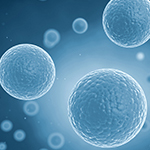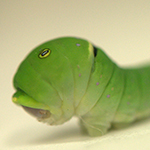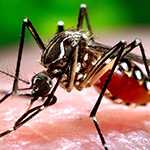Areas of Research

Anatomy & Physiology
Now that sequencing whole genomes is possible, the next big problem is to understand what those genes do. This is the realm of anatomy (study of the structure of tissues, organs, and organ systems) and the closely related field of physiology (study of how those structures work). Researchers in the department study adaptations to subzero temperatures, circadian control of metabolism, neuroendocrinology, evolution and pathobiology of the mammalian skull, and reproductive biology. Many of our physiologists bridge the molecular and the organismal.

Cancer
The cancer biology program draws upon a variety of distinct and complementary approaches to better understand the molecular, cellular and genetic determinants that govern tumor formation and disease progression. Utilizing a combination of experimental in vitro and in vivo models as well as clinical samples, our researchers investigate fundamental mechanisms that govern tumor initiation, cancer cell migration and invasion, tumor cell survival, metastasis, cell cycle control, the tumor microenvironment and chemoresistance. Many projects bridge basic research with clinical platforms for cancer diagnostics and treatment.

Cellular & Molecular Biology
Cell biology is the study of cells, the basic structural unit of all living systems. Our researchers seek to understand how cells work as individual units with a focus on membrane and cytoskeleton organization, how they organize into complex groups, how they coordinate their activities in organismal systems and how they respond to extracellular signals and infectious agents. Dissecting how cells function at the molecular level is becoming increasingly important for understanding the cellular basis of human disease.

Development & Regeneration
Investigators in our department use a variety of model systems to answer fundamental questions in developmental biology and regeneration. Our researchers examine the mechanisms that direct cell growth, differentiation, organogenesis and regeneration of tissues such as blood, heart, retina, and kidney, relevant to our understanding of human development and disease. Researchers are also using innovative molecular approaches to understand the biology of stem cells, such as to uncover the genetic pathways that regulate induced pluripotent stem cells and factors that govern the behavior of tissue-specific stem cells in the body.

Ecology & Environmental Biology
Profound changes are affecting our environment, from climate change to habitat loss, pollution, and invasive species. Understanding ecosystems and their function is critical to crafting a sustainable future for humans and the planet. Our researchers study the responses of organisms to the environment and the interactions among species in ecological communities. We work in terrestrial and aquatic ecosystems in all corners of the world, from the savannas of Africa to the grasslands and rivers of Alaska and the Arctic. Laboratory and mathematical experiments augment field studies, and many researchers apply their research in management and policy.

Entomology
Most of the world’s animals are insects. Insects play a critical role in ecosystem function, many of them transmit dangerous disease, and some of them are endangered by environmental change. Researchers from across all areas of the department work with insects, sometimes as models for basic physiology and development, sometimes to understand infectious disease, and sometimes to study population dynamics and the interaction of species such as herbivores and host plants. As a result, the university has excellent facilities for rearing insects, and core facilities for the study insect genomes.

Epidemiology & Population Biology
Modeling of the many layers of information in biological systems has long been a mainstay of biology investigation. As the magnitude and quality of data grow exponentially, epidemiological modeling of the key features of disease have become pivotal to the discovery process in our efforts to understand and combat infectious diseases. Furthermore, the mathematical descriptions of populations have been empowered by modern genomic approaches that give us fine-resolution views of genome organization and its impact on disease genetics, geographic variation and the spread of both pathogens and alleles that are the focus of several Notre Dame faculty.

Evolutionary Biology
Organisms are evolving and changing every day, creating, molding, and even deleting genetic diversity. Meanwhile, next-generation sequencing is reinventing evolutionary biology and our ability to track and probe evolutionary processes. Our researchers use cutting-edge tools to understand evolutionary processes within whole genomes that lead to differences in organismal function. We also use evolutionary differences to detect species in nature and predict their responses to environmental change. We study the evolution in many organisms, mostly in wild populations, including human diseases and their hosts.

Genetics & Genomics
Notre Dame Biology faculty are engaged in a wide range of genetic studies that leverage the inheritance patterns (chromosomes and genes) that confer important traits. Modern genomic tools and approaches, including whole genome sequencing and 'transcriptome' analysis, are dramatically empowering the search for the genes and mutations that determine diseases, development, drug resistances and even natural variation and speciation. Notre Dame has established both the instrumentation and interdisciplinary analytical facilities to support these expansive and revolutionary views of biological systems at the resolution of molecular mechanisms.

Infectious & Vector-Borne Diseases
Researchers investigate the cellular and genetic determinants of infectious diseases with emphases on the host response to infection, modeling and epidemiology of disease and mechanisms of transmission and prevention. The program is highly collaborative, interdisciplinary and bridges basic sciences with comprehensive educational and research endeavors to help build integrated programs in global health.

Microbiology & Immunology
Microbiology is the study of single-celled and multi-celled microscopic organisms. Many microorganisms cause dangerous infectious diseases. Immunology is the study of the immune system in a diversity of organisms. Microbiology and Immunology go hand in hand, as microbes that cause disease trigger an immune response and manipulate the immune system during infection. Researchers work with bacterial and eukaryotic microorganisms and viruses, which cause a range of diseases including Dengue Fever, Malaria, Leishmaniasis, and Tuberculosis. They are also interested in understanding how the immune response in host organisms responds to infection.

Neuroscience & Behavior
Neuroscience is an interdisciplinary field that considers problems from multiple perspectives, including molecular level processes and complex social behaviors. Our researchers work in the areas of sensory neurobiology (especially vision and olfaction), stress and pain processes, circadian rhythms, control of social behaviors, and computational neuroscience. We collaborate with colleagues in the departments of chemistry and biochemistry, psychology and anthropology, among others.